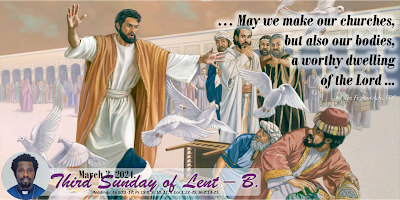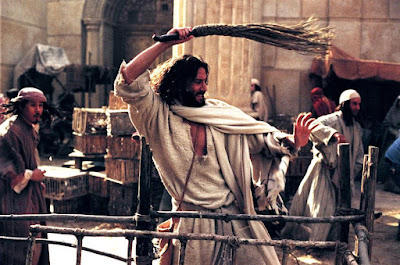JESUS THE NEW LAWGIVER, JESUS THE SIGN.
March 3, 2024.
Third Sunday of Lent – B.
A Sicilian proverb says: “When the hunting dog barks it's a
signal that the prey is near.” A Swahili proverb adds: “Clouds are the sign of
rain.”
Someone, one day came to me with this question, “Father, how
much is the wedding in your parish? My companion and I would like you to be the
one officiating our wedding.” I smiled and answered, “How much is your love for
your partner?” And that is a sad reality. Sacraments and liturgical services
are not for sale. They are priceless. But the practice and the reality make
people think that we sell them. For a baptism, we fix fees. For confirmation we
have fees. For weddings, not only the gathering of documents is costly, but
there is also a fee. Blessings and some other liturgical acts are also
accompanied by donations… So people think we sell them. Jesus, today, comes to
give us a sign. He purifies the temple so that we too should purify our
practices in the Church.
“What sign can you show us for doing this?” (John 2:18)
Lenten Season is a journey at the discovery of Jesus, who day after day reveals
himself to us through many ways. On the first Sunday, the Lord was shown as the
true faithful to the Father who, despite all the temptations, did not fleet or
lose his obedience and faithfulness to the Father. On the second Sunday, with
the episode of the Transfiguration, the Lord was revealed to us as the Only
Begotten and beloved Son of the Father. We were, through Peter, James, and
John, exhorted to listen to him. There also, in the scene of the Tabor, we were
given a glimpse of the coming passion of the Lord, another sign of God's
revelation to us.
Today, through the episode of the purification of the Temple
and the discussion that follows, we are given another great sign, Jesus, as a
means and protagonist of true purity. He came to drive away from man, all that
keeps us away from God, starting with the material things.
There is no better spectrum for us to see God's presence
among us and his hands at work in us than obedience to his word. The first
reading puts us in the challenge of obedience. Through the giving of the Ten
Commandments to his people, the Lord invites them to become a nation of unique
purpose, faithfulness to God, and love and care for their neighbor. The Ten
Commandments are the light through which everyday life should be evaluated.
They point to our relationship and responsibility toward God, toward ourselves,
and our neighbor.
The Commandments 1-3 are about our responsibilities towards
God. We are urged to see that in all aspects of our lives, God should be first.
God before all, and God above all. And then, once the primacy of God is stated
and priority is given to him, we can turn to ourselves.
The 4th commandment, relationship, and responsibilities
toward our parents with its direct implication on our own life: "that you
may have a long life..." By honoring our parents, the blessing befalls us,
a long and peaceful life.
Then comes the third dimension of the divine commandments,
our relationship with others, 5-10. These are all about how we treat other
humans. They speak of the concern we should have for our neighbors. In that
sense, the Ten Commandments could be seen and understood as the guidelines or
Vademecum of a sound relationship with God, with oneself, and with others. The
aim of these relationships is holiness. Because God wants us holy, so he gave
us these ten rules. They are not just in order to demonstrate love and respect
for God and others, but to keep us holy, and lead us to perfection. It is also
for that perfection Jesus came.
In the scene of today's Gospel, the purification of the Temple,
the Lord expresses his concern for people's holiness. His burning zeal for
God's house, the anger that consumes him is because people have turned away
from righteousness and transformed his Father’s house into a marketplace, a den
of thieves. Through a deeply meaningful gesture, he calls them to fulfill the
first three commandments of the Mosaic Law, to put God above and beyond all,
and to honor him truthfully.
Oftentimes, we too transform our relationship with God into
ritualistic and commercial things. Many people, beginning with us pastors and
Church leaders, have transformed our churches and parishes into markets or
business centers. The material is more venerated and sought after than God. In
some parishes, everything is possible for those who have money. And the Word of
God is easily replaced by the words of the world: first collection, second
collection, fundraising, “Arancel” or taxes (tariffs)... every single thing has
its fee. But sadly, catechetical formations are often forgotten. We need a
transformation and a thoroughful purification in our communities. The Lord
invites us to be burning with zeal for God and spiritual things rather than for
material possessions. By overthrowing the money of the changers, driving
merchants out of the Temple, and overturning commercial tables, he raises the
sacrality of God's house. His words are even clear after his gesture: “Take
these out of here, and stop making my Father’s house a marketplace.” Could we
let these words touch us?





Good message Fr
ReplyDelete